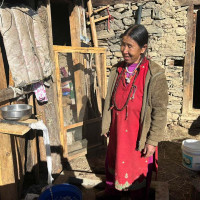- Monday, 15 December 2025
Nepal ranks 78th in CRI 2025
By A Staff Reporter, Kathmandu, Feb. 16: According to the Climate Risk Index (CRI) 2025, published by Germanwatch, Nepal ranks 78th among countries affected by extreme weather events due to climate change over the past three decades (1993-2022).
This index is prepared based on the impacts of climate change-induced natural disasters such as scorching heat, heavy rainfall, raging wildfires, deadly floods and devastating storms in various countries.
According to the index, an average of 249.7 people lose their lives each year in Nepal due to climate-related disasters. The mortality rate is 0.189 per 100,000 people, while 75,840 individuals are directly affected annually.
Similarly, the report indicates that Nepal suffers an annual economic loss of around USD 221.3 million due to climate-induced disasters, which accounts for 0.258 per cent of the country's Gross Domestic Product (GDP).
According to the report, extreme weather events have become increasingly common worldwide. From 1993 to 2022, more than 765,000 lives were lost and direct economic losses of nearly USD 4.2 trillion (inflation-adjusted) were recorded due to more than 9,400 extreme weather events. The frequency and intensity of climate-related disasters continue to rise, underscoring the urgent need for climate action.
In 2022, the most affected countries were Pakistan, Belize and Italy, followed by the United States, Spain and Greece. Dominica, a Caribbean island nation, ranks first among the ten most affected countries by climate-related disasters, followed by China, Honduras, Myanmar, Italy, India, Greece, Spain, Vanuatu and the Philippines.
In Pakistan, a heavy monsoon season brought devastating floods, landslides and storms, affecting more than 33 million people, causing over 1,700 fatalities, and resulting in nearly USD 15 billion in damages. A heatwave earlier in the year claimed more than 90 lives between June and September 2022, the report said.
According to the report, human-induced climate change affects the frequency and intensity of extreme weather events, leading to widespread adverse climate impacts. The latest climate science and significantly improved attribution science suggest that climate change's influence on extreme weather events is "on the same level of scientific confidence as the statement that human influence has warmed the climate."
The report said that COP29 failed to deliver an ambitious New Collective Quantified Goal (NCQG) on Climate Finance. Given the identified needs and the great urgency of the climate challenges faced by developing countries, the USD 300 billion annually by 2035 can only be seen as the bare minimum response to the escalating climate crisis.
The NCQG also failed to include measures to address loss and damage. This gap must be filled as soon as possible. The situation is even more concerning given the significant gaps in adaptation finance compared to the needs and commitments, despite some progress. Significantly increased support from high-emitting countries and other polluters is needed to help the most vulnerable address climate impacts, the report said
















